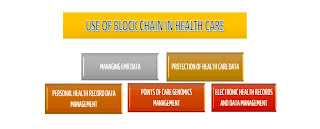BLOCK CHAIN
BLOCK CHAIN
Block chain is a decentralized network used to share the information about tracking and tracing of the manufactured and shipped drugs by the pharmaceutical industries.
TYPES OF BLOCK CHAIN
There are different types of Block chain they are as follows:
1. Public Block Chain
2. Federated Block chain
3. Private block chain
4. Hybrid Block chain
PUBLIC BLOCK CHAIN: The network which is open for everyone and has all the rights to download, run or can also add blocks to the chains.
FEDERATED BLOCK CHAIN: Federated type of block chain is quiet opposite to the public block chain. In this type of block chain, a group of people have access to the information. No one can join, participate, run or download information from this type of block chain.
PRIVATE BLOCK CHAIN: This type of Block chain is similar to the federated block chain system and the only main difference is that private block chain system will be controlled only by one person and not by a group of individuals.
HYBRID BLOCK CHAIN: Hybrid block chain is the combination of the private block chain with the rights of public block chain system. This type of block chain system can help in maintaining transparency with a security and privacy.
✓ Block chain can be used in pharma industries and health care as follows
Block chain is used in pharma in following cases
1. Drug Safety.
2. Inventory Management.
3. The manufacturing supply chain.
4. Clinical trial management.
5. Public safety and consumer awareness.
DRUG SAFETY:
The application of block chain features in manufacturing processes can help in providing complete traceability details of the drugs from the manufacture to the end consumer of the drug.
INVENTORY MANAGEMENT:
The block chain would increase the manufactures inventory management levels and thus can help to prepare drugs high stocks during demands. The block chain-based system would also increase the efficient flow of drug and can cause financial hikes.
THE MANUFACTURING SUPPLY CHAIN:
Block chain helps in providing access to the pharmaceutical industry about the drug supply chain from manufacturing details to end consumers. Block chain-based system can easily lower the financial burden of entire drug tracing and tracking process.
PUBLIC SAFETY AND CONSUMER AWARENESS:
Safe and effective medicines can be delivered to the patients (end consumer) by tracking and tracing process.
CLINICAL TRIAL MANAGEMENT:
Block chain is into clinical trials to identify and validate all the points of the large molecular drug from the clinical trials to the final product for marketing. Block chain is also required to provide patients with a clinical kit for safety and to get precise results.
Current challenges and situations in pharma industries
1. Generic drugs increased competition.
2. Rising customer expectations.
3. Time consuming.
4. Supply chain inefficacy.
The challenges solved by implementing block chain system are as follows:
1. Pharma supply chain compliance.
2. Better returned drug validity.
3. Inventory management.
4. Clinical trail data quality and reliability.
5. Better clinical trial process.
Block chain is used in health care in following cases:
1. Managing electronic medical record (EMR) data
2. Protection of healthcare data
3. Personal health record data management
4. Point-of-care genomics management
5. Electronics health records data management
Using block chain can improve many health care systems like:
DATA SECURITY:
Using block chain system can help in protecting the health information of the patients and can also reduce the chance the hacking.
MOBILE HEALTH APPS AND REMOTE MONITORING:
Block chain ensures in keeping all the EMR data secure and also helps in remote monitoring by sending the medical data rapidly to the physicians or other health care professionals.
HEALTH INSURANCE CLAIMS:
Implementing block chain in the health insurance can decrease the chances of fraud claims a.
TRACKING AND TRACING DISEASES AND OUTBREAKS:
Block chain can help in finding the main cause, origin, transmission of a particular diseases or infections thus can also be implemented in epidemiological studies
REFERENCES
• https://101blockchains.com/ultimate-blockchain-technology-guide/#types
• https://pharmaphorum.com/views-and-analysis/five-use-cases-for-blockchain-in-pharma/
• https://101blockchains.com/blockchain-in-pharma/
• news-medical.net/health/Blockchain-Applications-in-Healthcare.aspx
NAME: B. AKHILA SAI
PHARM D INTERN
CMR COLLEGE OF PHARMACY
CLINOSOL ID: 07/0421






Comments